I’ll dispel one major belief that seems to hang over The Black Hole like a cinematic dark cloud and that of Disney trying to shamelessly cash in on Star Wars and that they bombed in the attempt, this is not true, for one the film was well into pre-production before Luke Skywalker left his home world of Tatooine and secondly it did make a profit.
Note: Even though the film eventually made it into the profit column it only managed to take in $36 million dollars domestically on a $20 million dollar budget, drastically under-performing to expectations. That would certainly not have impressed the shareholders.
In fact aside from cute robots making an appearance there isn’t all that much to compare between the two films; Stars Wars was pure space fantasy while The Black Hole was more in the vein of such science fiction films as Destination Moon and The Forbidden Planet. The key problem with The Black Hole was not in its subject matter or the special effects, which were pretty amazing for the time, but that the script was simply terrible and that they went into production without even having an ending figured out.
Incredible matte painting can do a lot but sadly they can’t solve poor plotting.
The movie introduces us to the crew of the spacecraft USS Palomino while they are on their return leg from a deep space exploratory mission; the crew consists of Captain Dan Holland (Robert Forster) the stalwart commander who must make the tough decisions, First Officer Lieutenant Charlie Pizer (Joseph Bottoms) the brash young space hero, Harry Booth (Ernest Borgnine) a journalist whose cowardly nature could spell destruction for them all, then we have Dr. Alex Durant (Anthony Perkins) as the expeditions civilian leader and person you'd least like to have visit you in the shower, and finally there was Dr. Kate McCrae (Yvette Mimieux) the ships psychic whose ESP abilities seem to be plot specific and only used for her to telepathically communicate with the ship's robot V.I.N.CENT (Vital Information Necessary Centralized), voiced by Roddy McDowall. I’m sure on their prior missions she had other important duties to perform but in this movie everything Dr. McCrae does could be replaced by a Radio Shack walkie-talkie.Note: We never do see her communicate with any of her human crew members via ESP just the robot, which is kind of bizarre because mentally linking with a machine doesn’t seem very ESPish, but then again I’m no expert on telepathy so I’ll let that slide.
The crew of the Palomino are stunned when they discover a large spaceship seemingly perched at the edge of a massive black hole; Dr. Durant is especially impressed as he intones with much gravitas, “The most destructive force in the Universe. Nothing can escape it, not even light.”
When watching this film you should be prepared to hear everyone speaking as if whatever is happening is the most significant thing that has ever happened. Self-importance just oozes out of every frame of this movie as if the four screenwriters, and yeah there four writers which is never a good sign, were writing a story to rival the works of Isaac Asimov and Arthur C. Clarke, but when the film finally rolls to its “conclusion” the audiences is left realizing that nothing substantive has been said about anything. When your film is about one of the universes biggest mysterious you’ve got to put at least some thought in to it.
It’s a visually stunning whirlpool but has little bearing on the movie’s actual plot.
What story we are given owes more to likes of Jules Verne and Shakespeare then it does Clarke or Asimov; when the crew of the Palomino learn that the ship they’ve spotted is the long-lost USS Cygnus, and that the only person on board is the famous Dr. Hans Reinhardt (Maximillian Schell), we get serious Captain Nemo vibes with a heavy dose of The Forbidden Planet, which of course was a science fiction update of Shakespeare’s The Tempest. In The Black Hole we have Reinhardt as this film’s version of Prospero and in place of a the villainous island native Caliban from the play we get a robot by the name of Maximilian, who looks like he was purchased from a Sharper Image catalog edited by Satan.I will admit that Maximilian is one damn fine piece of robot design.
We learn that Dr. Hans Reinhardt had been ordered to return to Earth, his mission to find “inhabitable life” (that should have been “Inhabitable worlds” but somehow this kind of mistake got by four writers) being deemed a failure, but he tells our heroes that his ship had suffered major damage from a meteor field and that his communications equipment had been wrecked. Reinhardt explains that he is the sole human aboard, having sent the rest of the crew off twenty years ago, and he appears shocked to find out that his crew never reached Earth.In the two decade since he has apparently spent all his time studying the black hole with the intent of someday, “Going in, through and beyond!” That he is lying about the fate of his crew is fairly evident and soon even our dimwitted heroes have figured out that the android crew that Reinhardt supposedly built are actually zombified crew members via laser lobotomy. Harry discovers that the Cygnus has an AgroPod big enough to feed an entire crew yet the ship supposedly only has one human on board and Captain Holland witnesses what appears to be a funeral procession for one of the androids. This is when the shit hits the fan and Reinhardt orders his robot Stormtroopers, who look and move like goose-stepping cybermen from Doctor Who, after the Palomino crew with orders to “Liquidate our guests.”
Lucky for our heroes these robots are even worse shots than your average Stormtrooper.
Now this all may sound rather exciting; an obsessed Captain Nemo like character having lobotomized his crew to fulfil a mad dream to explore a black hole, a ship manned by said creepy humanoids as well as laser gun toting robots led by a robot devil with spinning Cuisinart blades for arms, we even have a ship that looks like a cross between an oil refinery and the S.S. Poseidon, and all of this would one would assume would lend itself to a pretty gripping an action packed tale, but sadly it doesn’t.So how can a film with all those elements, including a first rate cast, fail to engage an audience? Well instead of a sci-fi blockbuster or a taught and thought provoking tale we got an overwritten melodrama with some of the hammiest lines of dialog ever uttered on film. The robot V.I.N.CENT's sole character trait is that he speaks in clichés such as, “There are old pilots and bold pilots but very few old bold pilots” and he keeps uttering them with such frequency that one must assume he was programmed by Uncle John’s Bathroom Reader. Then we also meet an old battered robot B.O.B. (Bio-sanitation Battalion) that has us wondering why someone would program it with the voice of Slim Pickens, sure we are told it was designed in Houston but would even a Texan robotics engineer incorporate such a voice into a robot?
Maybe the programmer was a huge Dr. Strangelove fan?
The movie isn’t even helped by the score provided by the great film composer John Barry because even though the movie has some wonderfully operatic themes, stuff you'd expect in a space opera, when the final act eventually kicks into gear we get this down tempo and ponderous music during the supposedly exciting laser battles between our heroes and the evil robots. What was Barry thinking? The entire film is guilty of having the worst pacing ever as each scenes seems to just plod along until the next bit of melodrama must be thrown at us by one of our main characters; Anthony Perkins will spend most of the screen time ass kissing Maximillian’s Schell’s mad scientist Reinhardt, the hot shot young hero Pizer is only around so that he can argue with V.I.N.CENT, “When I volunteered for this mission, I never thought I'd end up playing straight man to a tin can” and then we have both Robert Forster and Yvette Mimieux who both seem completely out of place in the film, and then there's Ernest Borgnine’s character who never made any sense to me from the start and had me asking, "What kind of news outlet sends middle-aged out of shape reporters on a deep space missions? Did his editor hate him that much?"I guess surviving The Poseidon Adventure gives him some screen cred here.
Of course the real stars here are the movie's visual effects, and they are spectacular; the film sports 150 matte paintings by the great artist Peter Ellenshaw and the model design and construction of the spaceship Cygnus is absolutely fantastic. The shots of the little Palomino craft as it search lights scan the dark hull before the Cygnus suddenly lights up like a high-rise on Christmas Eve is simply stunning. It’s clear that not only did a lot of money go into this project but also a lot of love, but no matter how awesome your movie’s visual are if they are in service of a lacklustre script the film is pretty much doomed.As I mentioned earlier this film began shooting without a finished script, which kind of explains why the film really doesn’t have much of an ending, and as our heroes follow the mad Hans Reinhardt into the maelstrom of the black hole we get a bit of stuff that a charitable person would say was an “homage” to the trip through the monolith in 2001: A Space Odyssey, but then the film all of a sudden goes Biblical for no rational reason as our "heroes" pass through Heaven and Hell. You can just picture those four sad sack writers banging their heads against the wall as they try to come up with an ending, and I'd say director Gary Nelson should have had them shot for dereliction of duty. So what did these genius writers eventually come up with? We see Hans Reinhardt and the evil robot Maximillian doing a bit of space ballet before Reinhardt finds himself trapped within his own creation and then we see them literally in Hell.
Parents at the time must have had fun explaining this to their kids.
Earlier in the film Anthony Perkins compared the black hole to Dante’s Inferno so I guess that can be called foreshadowing but then the movie decides to double down on the Bible motif by the appearance of an angelic being that guides us through crystal hallways that I’m assuming we are to take as Heaven. Eventually our heroes and their spacecraft are spit out the other side of the black hole, all perfectly fine after their cosmic trip, but before any of what we just saw could be explained the film abruptly ends with a quick shot of their ship flying through space towards a new planet near a bright star and...roll credits.The Black Hole had a lot of potential but saddled with a weak script, and a director mostly known for television work, it really didn’t stand much of a chance. We are constantly treated with glimpses of the better film this thing could have been; Hans Reinhardt is depicted as your clichéd obsessed mad scientist but there is a moment in the film where he runs up to Kate, right after the evil robot Maximillian has buzzsawed into Durant’s chest, and he whispers to her, “Protect me from Maximillian.” What is that about? We do see that the robots all seem to function in some autonomous fashion, with Maximillian tending to take things into his own hands (clamps?) but we never get the impression that he isn’t anything more than a mechanical thug created by Reinhardt, so what’s his deal? Why at the end does Reinhardt fear him?
They should have focused the movie on rogue A.I. robots and skipped the black hole.
As mentioned earlier this movie was Disney Studios first PG rated movie, years before Touchtone or Miramax were created to handle this kind of more adult stuff, but there really isn’t much here to offend anyone or frighten children. I guess the use of the word “damn” as well as images of Hell and the occasional on screen death were enough to make censors force the PG rating on the film but there certainly isn't anything here that most kids would even blink at as all the violence is quite bloodless. Unfortunately bloodless pretty much sums up this entire film as it is quite pale and lacks any real substance, which is a shame as the visuals are often breathtaking. So if you come across The Black Hole on Netflix or Turner Classic Movies give it a perusal if you are the curious sort, but just be sure to lower your expectations a tad or two.Final Thoughts:
• The actors walking around in slow motion to simulate no gravity is pretty goofy.
• The film's designers chose to make V.I.N.CENT a hovering robot to differentiate him from R2-D2 but the amount of times you can spot the wires he is hanging from illustrates this was a bad idea.
• The robots aboard the Cygnus have a rec room where they can challenge each other at laser target practice yet despite the need for robots to practice targeting being patently ridiculous it also apparently didn’t help as they can’t seem to hit our heroes even when they are standing still and right out in the open.
• The double barrel horseshoe shaped laser guns the bad robots use makes no practical sense.
• The hull of the Cygnus is breached in multiple places by meteors yet our heroes survive catastrophic decompression when they should have all died almost instantly and been sucked out into space.
• V.I.N.CENT notifies his friends that “A meteorite struck the ship” and you’d think a robot that is supposedly a "Vital Information Necessary Centralized" unit would know that a meteor is only referred to as a meteorite when it passes into a planet’s atmosphere.
The Black Hole is a film that bills itself as science fiction movie and a not space fantasy but more often than not it goes for “What looks cool” over making things scientifically accurate, and to be fair I’m normally okay with this but only if the story is good enough to make me forgive such things, sadly that is not the case here.
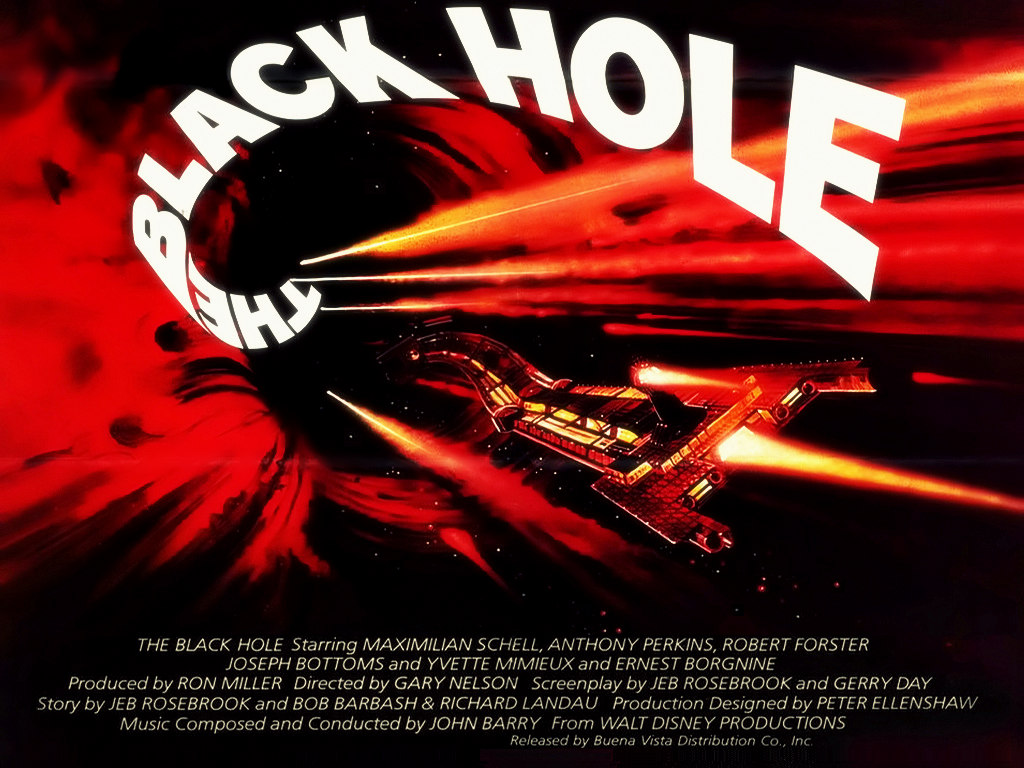
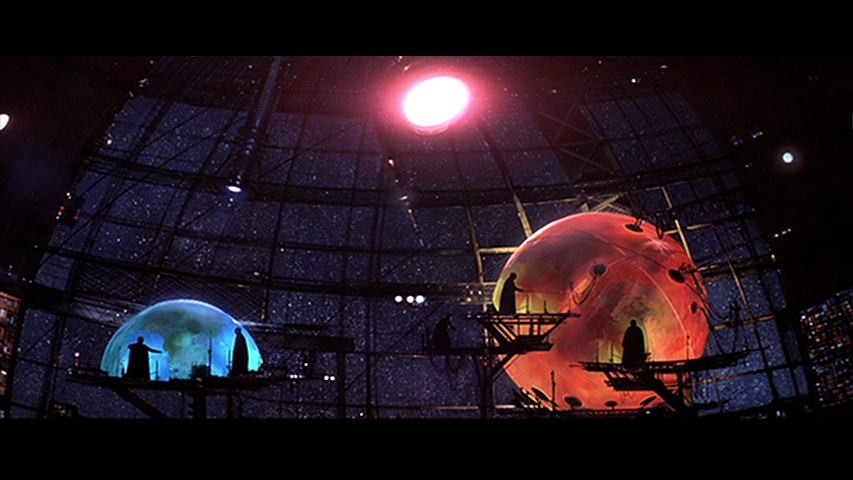

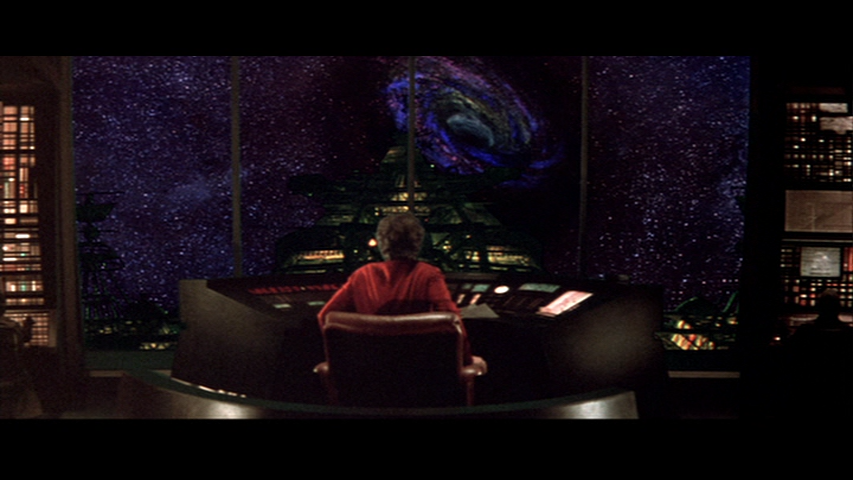

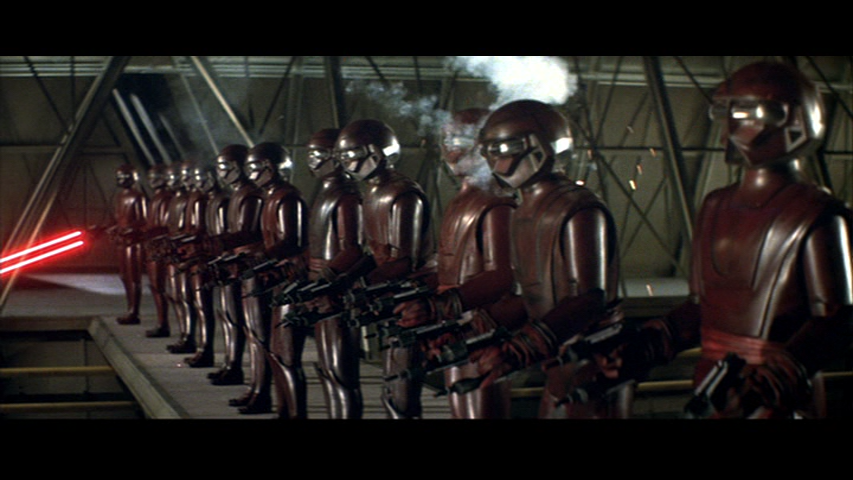
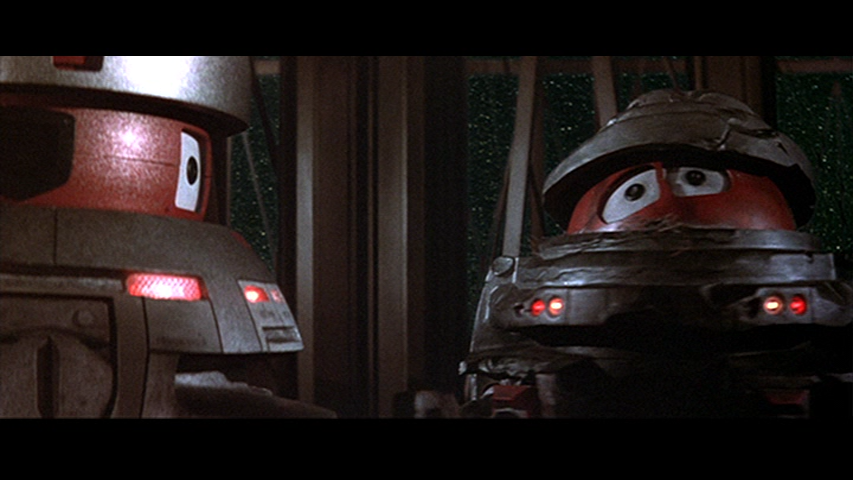
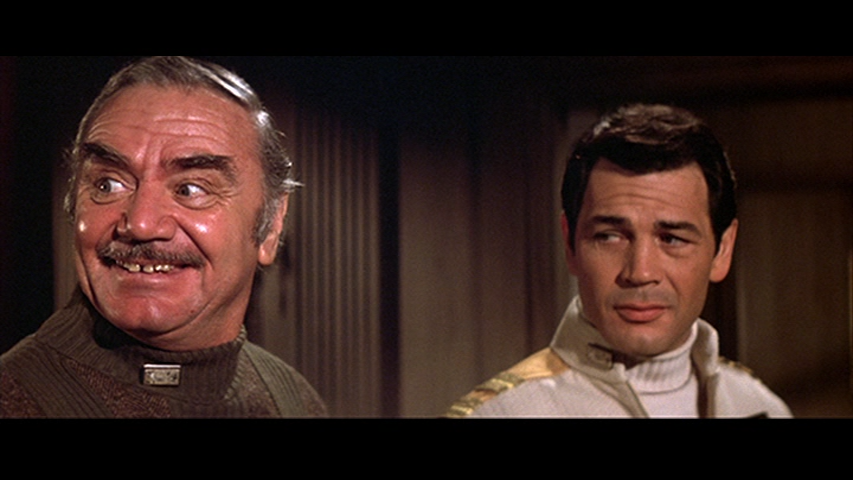
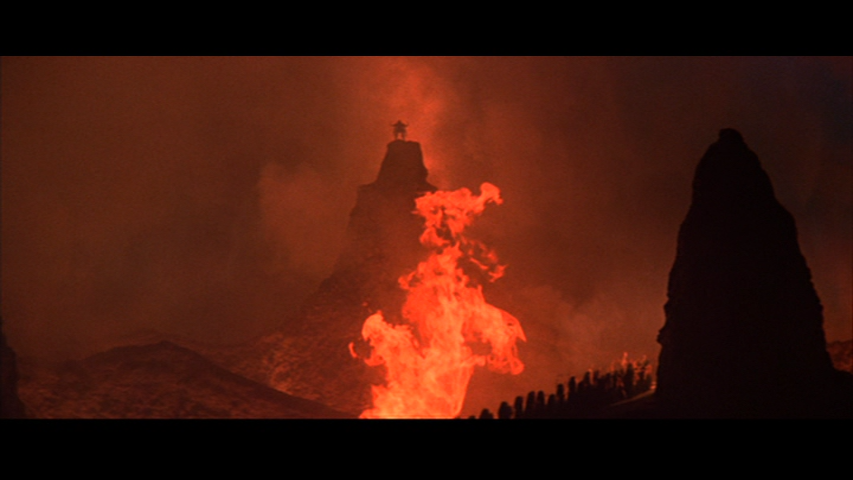
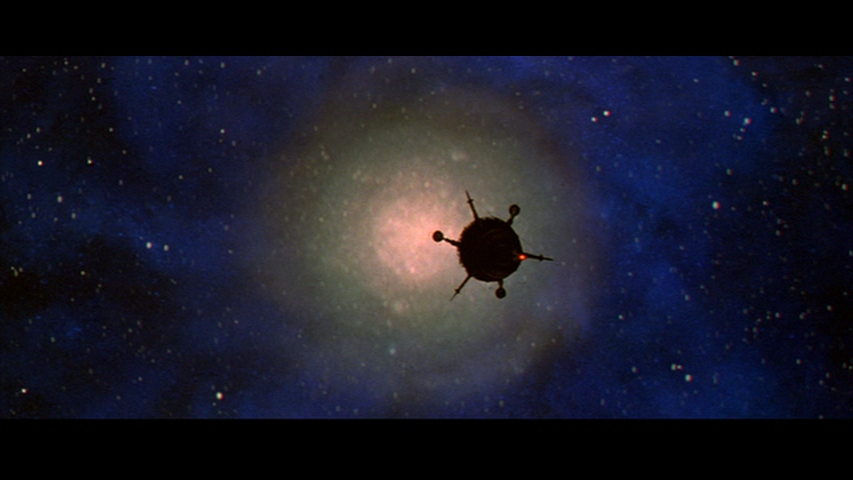

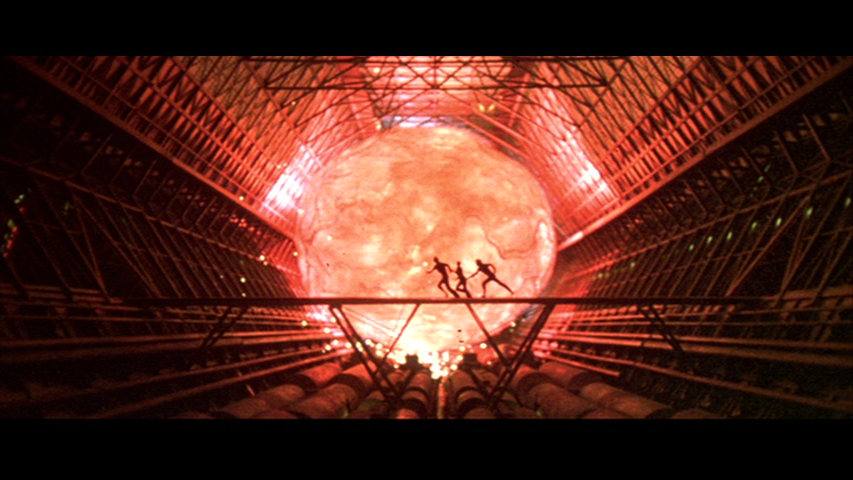

No comments:
Post a Comment